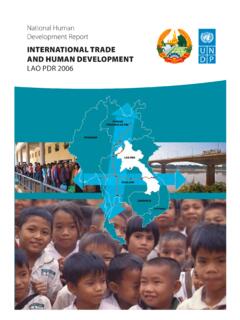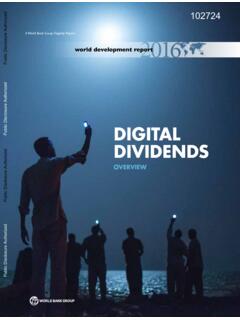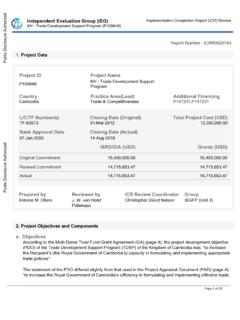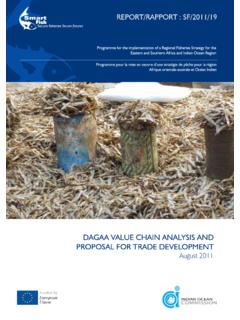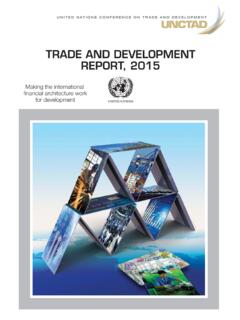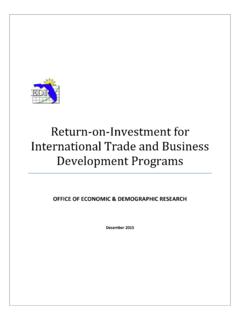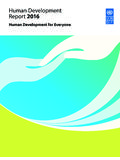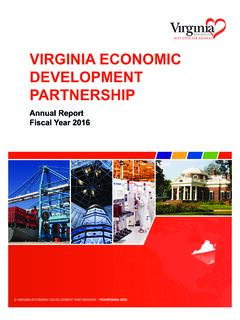Transcription of THE GLOBAL GOVERNANCE OF TRADE AS IF DEVELOPMENT …
1 THE GLOBAL GOVERNANCE OF TRADE AS IF DEVELOPMENT REALLY MATTERED* Dani Rodrik Harvard University John F. Kennedy School of Government 79 Kennedy Street Cambridge, MA 02138 (617) 495-9454 Revised July 2001 * This is a paper prepared for the UNDP. I thank Kamal Malhotra, Yilmaz Akyuz, Murray Gibbs, Gerry Helleiner, Gita Sen, UNDP staff and participants in a brainstorming meeting held in New York on October 13-14, 2000 for comments and suggestions, and Zoe McLaren for editorial assistance. The paper draws extensively on several of my previous writings, including most notably Rodrik (1999, 2000a, 2000b, 2001a, and 2001b). The responsibility for opinions in this paper rests solely with their author, and publication does not constitute an endorsement by the United Nations DEVELOPMENT Programme or the institutions of the United Nations system. THE GLOBAL GOVERNANCE OF TRADE AS IF DEVELOPMENT REALLY MATTERED report submitted to the UNDP Dani Rodrik Harvard University July 2001 EXECUTIVE SUMMARY It is widely accepted, not least in the agreement establishing the WTO itself, that the purpose of the world TRADE regime is to raise living standards all around the world--rather than to maximize TRADE per se.
2 In practice, however, these two goals--promoting DEVELOPMENT and maximizing TRADE --have come to be increasingly viewed as synonymous by the WTO and multilateral lending agencies, to the point where the latter easily substitutes for the former. The net result is a confounding of ends and means. TRADE has become the lens through which DEVELOPMENT is perceived, rather than the other way around. Imagine a trading regime in which TRADE rules are determined so as to maximize DEVELOPMENT potential, particularly of the poorest nations in the world. Instead of asking "how do we maximize TRADE and market access?" negotiators would ask "how do we enable countries to grow out of poverty?" Would such a regime look different than the one that exists currently? The answer depends critically on how one interprets recent economic history and the role that TRADE openness plays in the course of economic DEVELOPMENT . The prevailing view in G7 capitals and multilateral lending agencies is that integration into the GLOBAL economy is an essential determinant of economic growth.
3 Successful integration in turn requires both enhanced market access in the advanced industrial countries and a range of institutional reforms at home (ranging from legal and administrative reform to safety nets) to render economic openness viable and growth-promoting. I call this the "enlightened standard view"--enlightened because of its recognition that there is more to integration than simply lowering tariff and non-tariff barriers to TRADE , and standard because it represents the prevailing conventional wisdom. In this conception, today's WTO represents what the doctor ordered: the WTO's focus on expanding market access and deepening integration through the harmonization of a wide range of " TRADE -related" practices is precisely what DEVELOPMENT requires. I present in this paper an alternative account of economic DEVELOPMENT . This is an account that questions the centrality of TRADE and TRADE policy and emphasizes instead the critical role of domestic institutional innovations that often depart from prevailing orthodoxy.
4 In this view, transitions to high economic growth are rarely sparked by blueprints imported from abroad. Opening up the economy is hardly ever a key factor at the outset. The initiating reforms instead tend to be a combination of unconventional institutional innovations with some of the elements drawn from the orthodox recipe. These combinations tend to be country-specific, requiring local knowledge and experimentation for successful implementation. They are targeted on domestic investors and tailored to domestic institutional realities. 2 In this alternative view, a DEVELOPMENT -friendly international trading regime is one that does much more than enhance poor countries' access to markets in the advanced industrial countries. It is one that enables poor countries to experiment with institutional arrangements and leaves room for them to devise their own, possibly divergent, solutions to the developmental bottlenecks that they face. It is one that evaluates the demands of institutional reform not from the perspective of integration ("what do countries need to do to integrate?)
5 ") but from the perspective of DEVELOPMENT ("what do countries need to do achieve broad-based, equitable economic growth?"). In this vision, the WTO would no longer serve as an instrument for the harmonization of economic policies and practices across countries, but as an organization that manages the interface between different national practices and institutions. Therefore, a reinvigorated focus on DEVELOPMENT and poverty alleviation, along with a nuanced, empirically-based understanding of the DEVELOPMENT process, would have far-reaching implications for the manner in which the international trading regime and the WTO function. This paper is devoted to making the case for such a reorientation. My focus is on the broad principles, rather than specific recommendations. A key argument of the paper is that developing countries are short-changing themselves when they focus their complaints on specific asymmetries in market access (tariff peaks against developing country exports, industrial country protection in agriculture and textiles, and so on).
6 This way of posing their grievances reflects acceptance of a market-access mindset that does developing countries limited good. They would be far better served by pressing for changes that enshrine DEVELOPMENT at the top of the WTO's agenda, and correspondingly provide them with a better mix of enhanced market access and maneuvering room to pursue appropriate DEVELOPMENT strategies. Following the introduction, section II of the paper discusses the distinction between DEVELOPMENT strategies that focus on growth and those that focus on poverty alleviation. In practice, these two ends become inseparable once we recognize that policies that are targeted at the poor are likely to have particularly high growth payoffs. The main strike against existing TRADE rules is not that they over-emphasize TRADE and growth at the expense of poverty alleviation, but that they over-emphasize TRADE at the expense of poverty reduction and growth. Next, I turn to the fundamental determinants of economic growth (section III).
7 I argue that the enlightened standard view encompasses an impossibly broad and unfocussed DEVELOPMENT agenda, and one that is too biased towards a particular set of institutional arrangements. I emphasize instead the centrality of domestic institutional innovations (comprising a mix of orthodoxy with "local heresies") and of investment strategies that are tailored to the circumstances of each country. The argument is illustrated with a brief review of some successful DEVELOPMENT strategies. Section IV discusses the evidence on the links between TRADE policy and economic performance. The voluminous literature in this area, which forms the basis for the extravagant statements on the benefits of TRADE openness which one often hears, has to be approached with extreme care. A close look at this literature, and the evidence underlying the conclusions drawn, suggests that the issues are hardly clear-cut. Essentially, there is no convincing evidence that TRADE liberalization is predictably associated with subsequent economic growth.
8 In section V, I 3argue that this raises serious questions about the priority that the integrationist policy agenda typically receives in orthodox reform programs. The problem is not TRADE liberalization per se, but the diversion of financial resources and political capital from more urgent and deserving developmental priorities. I illustrate some of these tradeoffs in this section. Section VI develops some general principles for a world TRADE regime that puts DEVELOPMENT first. I emphasize that the TRADE regime has to accept institutional diversity, rather than seek to eliminate it, and that correspondingly it must accept the right of countries to "protect" their institutional arrangements. However, the right to protect one's own social arrangements is distinct from, and does not extend to, the right to impose it on others. Once these simple principles are accepted and internalized in TRADE rules, developmental priorities of poor nations and the needs of the industrial countries can be rendered compatible and mutually supportive.
9 This section discusses an opt-out mechanism to operationalize these ideas. The WTO is an institution devoted largely to bargaining over market access. "Free TRADE " is not the typical outcome of this process; nor is consumer welfare (much less DEVELOPMENT ) what the negotiators have chiefly in mind. Traditionally, the agenda of multilateral TRADE negotiations has been shaped in response to a tug-of-war between exporters and multinational corporations in the advanced industrial countries (which have had the upper hand), on one side, and import-competing interests (typically, but not solely, labor) on the other. The chief beneficiaries of free TRADE in textbooks--consumers--sit nowhere at the table. The features of the WTO can best be understood in this context, as the product of intense lobbying by specific exporter groups in the or Europe or of specific compromises between such groups and other domestic groups. The differential treatment of manufactures and agriculture, or of clothing and other goods within manufacturing, the antidumping regime, and the IPR regime, just to pick some of the key anomalies, are all the results of this political process.
10 Understanding this is essential since it underscores the important point that there is very little in the structure of multilateral TRADE negotiations to ensure that their outcomes are consistent with developmental goals, let alone that they be designed to further DEVELOPMENT . A key implication of the shift to a developmental mindset would be that developing nations have to articulate their needs not in terms of market access, but in terms of the policy autonomy that will allow them to exercise institutional innovations that depart from prevailing orthodoxies. A second implication is that the WTO should be conceived not as an institution devoted to harmonization and the reduction of national institutional differences, but as an institution that manages the interface between different national systems. This shift would have several important advantages. The first, and the most obvious one, is that this would provide for a more DEVELOPMENT -friendly international economic environment.
